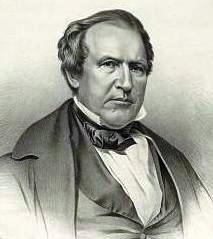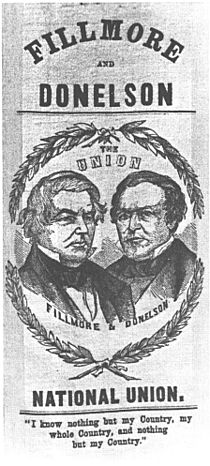Andrew Jackson Donelson facts for kids
Quick facts for kids
Andrew Donelson
|
|
|---|---|
 |
|
| United States Minister to Prussia | |
| In office July 18, 1846 – November 2, 1849 |
|
| President | James K. Polk Zachary Taylor |
| Preceded by | Henry Wheaton |
| Succeeded by | Edward A. Hannegan |
| United States Chargé d'Affaires to Texas | |
| In office November 29, 1844 – August 9, 1845 |
|
| President | John Tyler James K. Polk |
| Preceded by | Tilghman Howard |
| Succeeded by | Position abolished |
| Personal details | |
| Born | August 25, 1799 Nashville, Tennessee, U.S. |
| Died | June 26, 1871 (aged 71) Memphis, Tennessee, U.S. |
| Political party | Democratic |
| Other political affiliations |
Know Nothing (1856) Constitutional Union (1860) |
| Spouses |
Elizabeth Martin Randolph
(m. 1841; died 1871) |
| Children | 12 |
| Relatives | Rachel Jackson (paternal aunt/adoptive mother) Daniel Smith Donelson (brother) |
| Education | University of Nashville United States Military Academy Transylvania University |
| Signature | |
Andrew Jackson Donelson (born August 25, 1799 – died June 26, 1871) was an American diplomat and politician. He held many important government jobs as a member of the Democratic Party. Later, he was the candidate for US Vice President in 1856 for the Know Nothing political party.
After his father passed away, Andrew Donelson lived with his aunt, Rachel Jackson, and her husband, Andrew Jackson. Donelson went to the U.S. Military Academy (West Point). He served in the army under his uncle in Florida. Later, he left the army to study law and became a lawyer in Nashville. He helped Andrew Jackson in his campaigns to become president. When Jackson won the 1828 election, Donelson became his private secretary. After Jackson's presidency ended in 1837, Donelson returned to Tennessee and stayed involved in local politics.
Donelson helped James K. Polk become the Democratic presidential candidate in 1844. After this, President John Tyler chose Donelson to represent the United States in the Republic of Texas. Donelson played a big part in getting Texas to join the United States. In 1846, President Polk made Donelson the U.S. Minister to Prussia. Donelson left this job in 1849. He then became the editor of a Democratic newspaper. In 1856, the Know Nothing party chose Donelson as their candidate for vice president. He ran with former Whig President Millard Fillmore. Their team finished third in the election. Donelson also took part in the 1860 Constitutional Union Convention.
Contents
Early Life and Education
Andrew Jackson Donelson was born in Nashville, Tennessee. He was one of three sons of Samuel and Mary Donelson. His younger brother, Daniel Smith Donelson, later became a general for the Confederate States. Fort Donelson was named after Daniel. Andrew's father died when Andrew was about five years old. When his mother remarried, Andrew moved to The Hermitage. This was the home of his aunt, Rachel Jackson, and her husband, Andrew Jackson. Rachel and Andrew Jackson took care of all three Donelson sons.
Donelson went to Cumberland College in Nashville. He then joined the U.S. Military Academy at West Point, New York. He graduated second in his class in 1820. For two years, he was an officer in the U.S. Army. During this time, he was a special assistant to Andrew Jackson. Jackson was a major general fighting against the Seminoles in Florida. After this military campaign, Donelson left the army. He studied law at Transylvania University in Lexington, Kentucky. A year later, he started his own law practice in Nashville.
Political Career
Donelson helped his uncle, Andrew Jackson, during his presidential campaigns in 1824 and 1828. In 1829, when his uncle became President of the United States, Donelson became his private secretary. Donelson's wife, Emily, served as the White House hostess. She was like an unofficial First Lady of the United States because Rachel Jackson had passed away. Donelson stayed as Jackson's private secretary for all eight years of his presidency. While living in Washington, Donelson had a new home built. It was called Poplar Grove, later renamed Tulip Grove. This home was on land he inherited next to the Hermitage.
In 1836, Tulip Grove was finished. Donelson moved back to Nashville after Jackson retired in 1837. For the next seven years, Donelson helped the Democratic Party. He wrote newspaper articles to support Democratic ideas. He also helped Democratic candidates run for state and national jobs.
In 1844, Donelson played a key role in helping James K. Polk win the Democratic nomination for president. President John Tyler then appointed Donelson as the U.S. representative to the Republic of Texas. The hope was that Jackson's nephew could convince Sam Houston to support Texas joining the United States. Donelson succeeded, and Texas became part of the U.S. on December 29, 1845. Donelson was then made Minister to Prussia in 1846. He held this job until President Polk's Democratic government was replaced by the Whig government of Zachary Taylor in 1849.
Between September 1848 and November 1849, Donelson was the U.S. representative to the new government of Germany in Frankfurt. This government was short-lived.
In 1851, Donelson became the editor of the Washington Union, a Democratic newspaper. However, disagreements over slavery and other issues divided American politics. Donelson became unpopular with some groups within the Democratic Party. This led him to leave the newspaper in 1852. He then joined the Know Nothing (American) Party.
Vice-Presidential Nomination and Later Life
In 1856, Donelson was chosen as the running mate for former President Millard Fillmore. They ran together on the Know Nothing (American Party) ticket. Fillmore and Donelson received over 20% of the votes from the public. However, they only won the eight electoral votes from Maryland.
In 1858, Donelson sold Tulip Grove and moved to Memphis, Tennessee. He mostly took part in local politics there. He was also a delegate to the Constitutional Union party's national meeting in 1860. This meeting chose John Bell as its presidential candidate.
During the American Civil War, Donelson faced difficulties from both sides of the conflict. He also lost two of his sons in the war. After the war, during the Reconstruction period, he divided his time between his home in Memphis and his farm in Bolivar County, Mississippi.
Andrew Donelson passed away at the original Peabody Hotel in Memphis in June 1871. He is buried in Elmwood Cemetery.
Personal Life
Donelson married his first cousin, Emily Tennessee Donelson, in 1824. Emily passed away from tuberculosis in December 1836. They had four children:
- Andrew Jackson Donelson Jr. (1826–1859)
- Mary Emily Donelson (1829–1905)
- John Samuel Donelson (1832–1863)
- Rachel Jackson Donelson (1834–1888)
In 1841, Donelson married his second cousin, Elizabeth (Martin) Randolph (1815–1871). Elizabeth was the widow of Meriwether Lewis Randolph. Meriwether was a grandson of Thomas Jefferson. Donelson and his second wife had eight children:
- Daniel Smith Donelson (1842–1864)
- Martin Donelson (1847–1889)
- William Alexander Donelson (1849–1900)
- Catherine Donelson (1850–1868)
- Vinet Donelson (1854–1913)
- Lewis Randolph Donelson (1855–1927)
- Rosa Elizabeth Donelson (1858–1861)
- Andrew Jackson "Budie" Donelson (1860–1915)
Two of Donelson's sons died during the Civil War. John Samuel died at the Battle of Chickamauga. Daniel Smith was killed by an unknown attacker.
Images for kids
 | Charles R. Drew |
 | Benjamin Banneker |
 | Jane C. Wright |
 | Roger Arliner Young |


